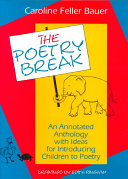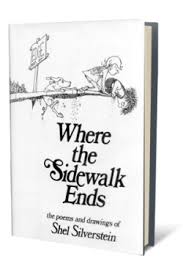April is the perfect month for a Poetry Break. Children’s literature champion Caroline Feller Bauer was a major role model for me during my career as a children’s librarian. Through workshops (where I first met Caroline) and her books, she generously shared creative and fun ideas for connecting kids with books. I learned about the Poetry Break from her and will be forever grateful.
The concept is simple: 1. Create a sign that reads “Poetry Break.” (I used foam core, markers, a stick for stirring paint, and mailing tape.) 2. Choose a poem. 3. You don’t have to, but I always put on a hat. 4. Walk into the designated space (classroom, program room, auditorium, your living room, etc.). 5. To get everyone’s attention, hold up your sign and say, “Poetry Break!” 6. Read your poem (with feeling). 7. Exit the space. An important rule is this — the poem is NOT to be used as a prompt for a ‘lesson’ afterwards. Poetry Break is purely a moment to be enjoyed. I used Poetry Break with great success as a school librarian, a public librarian, even as a recreation specialist at a senior center, leaving both children and adults wanting more.
My father loved and wrote poetry. I lost him to cancer 30 years ago. The last words I spoke to Dad were a Shel Silverstein poem—“Listen to the Mustn’ts”—a favorite of mine. I first shared it with him when he was in the hospital, when there was still hope. “Let me see,” he said and read it aloud three times. One day, after he had come home from the hospital for the final time, I heard him reciting some of the words to himself. And I whispered the poem in his ear on his last night in this world. I changed the word “child” to “Dad.”
I have been consciously focusing on the positive this year, so I don’t share this to dwell on my loss. On the contrary, Silverstein’s uplifting poem offers words of hope that I think we can all use.
So, here’s to Shel, to Dad, to Caroline Feller Bauer, and to all of you — POETRY BREAK!
Listen to the MUSTN’TS, child,
Listen to the DON’TS
Listen to the SHOULDN’TS
The IMPOSSIBLES, the WON’TS
Listen to the NEVER HAVES
Then listen close to me—
Anything can happen, child,
ANYTHING can be.


